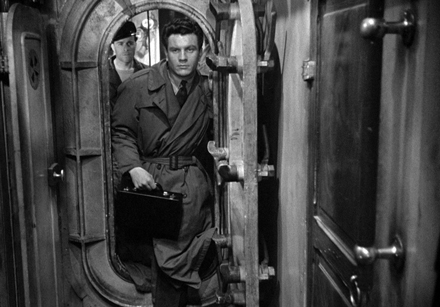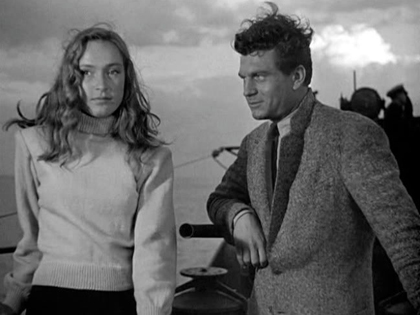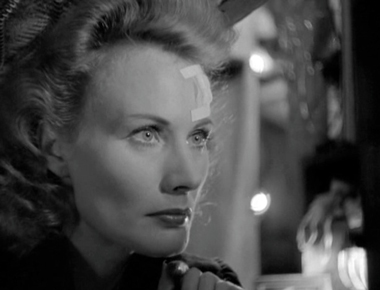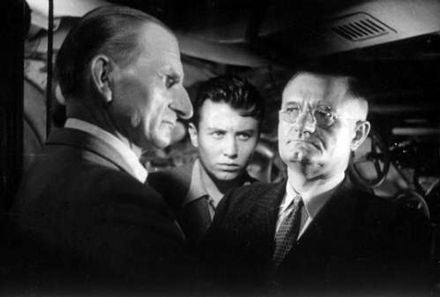
 |
|
|
|
There's The Damned by Luchino Visconti, originally called La caduta degli Dei, and The Damned by Joseph Losey, an original title for These Are the Damned. Get ready to add a third damned movie to your must-see lists, for René Clément's 1947 film The Damned (Les Maudits) is a terrific, long-neglected picture. As explained in Dominique Maillet's documentary, when the critics-turned Nouvelle Vague filmmakers insisted that French cinema needed a full overhaul, they chose to throw a lot of established directors under the bus. René Clément was a prominent example. His movies weren't artistically consistent. He sometimes preferred an impersonal documentary technique. Never mind that Clément directed the daring The Battle of the Rails, the powerful Forbidden Games and the best (by far) of the Zola adaptations, Gervaise. When Clément pulled off technical miracles he was slighted as a technician. He beat the New Wave newcomers at their own game with Purple Noon, fashioning a superior hip thriller that also launched a new star, Alain Delon. But with their journalistic background the Truffauts and Godards condemned Clément as a dinosaur. By the time of his epic war film about the liberation Is Paris Burning?, Clément was categorized as artistically null despite being a filmmaker who rarely made a dull picture. 
Made right after the close of WW2, The Damned takes on a very touchy subject -- the flight of Nazis to South America. As Hollywood pictures knuckled under to Cold War political pressure shows like the film noir thriller Cornered became scarce: we'd found a new enemy, and the righteous anti-Nazi stance of the war years was dropped like a hot potato. The Damned is about a group of Nazis escaping by submarine to Argentina (?) just as the war is ending. It's a terrific character study about arrogant, desperate people on a voyage to nowhere. In the Spring of 1945, a U-Boat leaves a Norwegian sub pen carrying a motley group of Nazis and their hangers-on. A General (Andreas von Halberstadt) slips aboard with his aide, as does the Italian manufacturer Garosi (Fosco Giachetti) and his beautiful, spoiled German wife Hilde (Florence Marly of Queen of Blood). Fervent Nazi politician Forster (Jo Dest of The Wages of Fear brings along his "aide", a Berlin thug named Willy Morus (Michel Auclair of Beauty and the Beast). Collaborator Couturier (Paul Bernard of Les dames du Bois de Boulogne) is anguished by the warrant put out for his arrest in liberated France. Also boarding is Swedish scientist Ericksen (Lucien Hector) and his 17 year-old daughter Ingrid (Anne Campion). When Hilde is knocked unconscious in a scrape with some Allied destroyers, the sub sneaks ashore at Royan, to kidnap a doctor. Forced on board, Frenchman Guilbert (Henri Vidal) soon realizes that he'll be killed when he's no longer needed. 
The confined space only worsens the clash of personalities. Garosi has long been aware that Hilde is the mistress of the General. Now that his riches are gone and Hilde rejects him, he loses the will to live. Forster tells the General that Hilde should be gotten rid of as dead weight, even though Forster has brought along Wili as his own 'personal companion'. Forster forces his will on everyone, reminding them that the Reich will continue no matter what happens. When word comes that Berlin has fallen, Forster effectively takes command. Dr. Guilbert searches for a way to escape, helped by the ship's sympathetic radio operator. Approaching Argentina, Forster is unable to make contact with his previous network of German agents, who he claims should be preparing to receive an unofficial SS 'command in exile'. He takes Morus ashore to confront their main contact Larga (Marcel Dalio of Casablanca), a coffee exporter who has been ignoring their secret radio signals. The Damned will be pure excitement for fans of WW2 intrigues. It's a submarine picture filmed largely on a real submarine at sea, with the only stock footage (none of it familiar) used for battle sequences. Clément constructed an accurate submarine set on a film stage, with roll-away walls to enable shooting from any angle. As is clearly evident in the film, he made little use of the wild walls, achieving a realistic, claustrophobic effect 35 years before Wolfgang Petersen's Das boot. In one scene Henri Alekan's camera follows Dr. Guilbert as he walks most of the way through the ship in the narrow corridor. The shot is accomplished without a Steadi-Cam. We never see any telltale camera shadows, either. And this is 1947! René Clément puts this pack of unpleasant characters in close quarters, and watches as the tensions rise. The Nazis behave as if their motives are political, when they're really just trying to survive. Garosi becomes more sullen as his wife flaunts her defection to the General. Both Garosi and Couturier feel threatened when the bullying Forster pounces on any talk that even hints at defeatism. Young Willi Morus shows hints of rebellion as he passively follows Forster's orders; at one point Forster whips him with a belt. 
To its credit The Damned refuses to take a commercial direction. Dr. Guilbert doesn't initiate a romance with the Swedish girl, as he's too busy trying to find his own escape route. He keeps a life raft stashed away under the deck, only to find that someone else has beat him to it. In the confined space there are no real secrets -- Guilbert sees little hope of survival. The Nazis and their minions remain despicable, but as their complexities emerge we accept them as complex people in a very strange predicament. The drama and the realism balance perfectly. Critics that applaud Steven Spielberg for so beautifully directing Jaws under impossible conditions at sea should be reminded of René Clément's achievement in this film. Purple Noon is even more accomplished, with its many scenes taking place on a tiny sailboat. Everything to do with the sub looks real, especially in a crucial rendezvous scene with a German tanker. Despite Forster's efforts, news that the war is over reaches the crew. Half the passengers jump ship while Forster blows a fuse and gives orders as if the Führer were still in charge. To our horror, the sub captain chooses to obey. Can we assume that in 1947 it was not common knowledge that the Allied victors were secretly protecting and hiring Nazi war criminals? Even the Vatican looked the other way as a network of ex-SS officers established safe havens in Argentina, Uruguay, Bolivia and Chile. The Damned shows our escaping villains discovering that the welcome mat has been withdrawn. Even their firm ally Larga now sells coffee to Americans. Every relationship breaks down during the voyage. When they board the submarine two fugitive Nazis consider Hilde to be an irreplaceable part of their lives. That doesn't last long. All those captured Nazis in the dock at Nuremburg were probably totally alone, without a single previous associate to admit knowing them. The more clever escapees had cynical exit strategies all worked out. 
All the actors make excellent impressions. Henri Vidal broods as the shanghaied doctor. Paul Bernard sweats as the slimy collaborator who realizes he's on the losing end of the losing side. Andreas von Halberstadt stays above the fray as the calculating General, while Jo Dest's firebrand for the Reich just gets more desperate. Michel Auclair is somehow sympathetic as the murderous thug, and Florence Marly is the most beautiful, ice-cold Valkirie imaginable. In the ensemble cast, not even Henri Vidal is granted unqualified hero status. The Damned refuses to be a simple thriller but it's also not an art picture, as Clément delivers plenty of action and destruction. It's one of the best submarine-set pictures I've seen and maybe the best-ever drama about Nazis fleeing from justice. 1 The Cohen Film Collection's Blu-ray of The Damned is a near-perfect encoding of this rare item, and a real find for avid disc collectors. Henri Alekan's B&W cinematography comes across perfectly -- even on the sub, most images are things of beauty. The clear sound is a plus as well. Dubbing would destroy the film, as not all characters speak all languages. The Swedish scientist doesn't know what's being said about him. Dr. Guilbert hides the fact that he speaks German, as well. This time around Cohen's extras are of Criterion quality. Judith Mayne and John E. Davidson's commentary offers a sparse but insightful analysis of the film's visuals and provides context for the cast of now mostly unfamiliar actors. The 55-minute documentary René Clément or the Cinema of Sketches presents a persuasive analysis of and defense for the director's reputation as a first-class filmmaker. We're reminded of his famous pictures but also of the less well-known fact that Clément served as a technical advisor and designer for other filmmakers, notably Jean Cocteau on La belle et la bête. He was a strict director but his actors loved him -- Gervaise lifted Maria Schell into a new bracket of respect. (A critic-commentator also disses Stuart Whitman and Charles Bronson, both of whom insisted on playing their parts without direction!) The best stroke is saved for last. We're told that Alfred Hitchcock was an admirer of Clément's technical prowess; then we see an exceptionally expressive shot during a murder scene that Hitchcock made use of in his later Psycho. An on-camera critic finds it particularly ironic that the New Wave directors would trash Clément and then laud Hitchcock to the heavens, when Hitchcock's own idea of a superlative director was none other than René Clément. I feel ready to see The Damned all over again, right away. Let's hope that the Cohen Film Collection has more great discoveries ready for release.
On a scale of Excellent, Good, Fair, and Poor,
The Damned Blu-ray rates:
Footnote:
1. Compared to what? Well, they're not Nazis fleeing from justice, but John Wayne in The Sea Chase and Marlon Brando in Morituri are in comparable murky circumstances. Both films invent possible love interests, but neither found favor with audiences.
Reviews on the Savant main site have additional credits information and are often updated and annotated with footnotes, reader input and graphics.
Review Staff | About DVD Talk | Newsletter Subscribe | Join DVD Talk Forum |
| ||||||||||||||||||